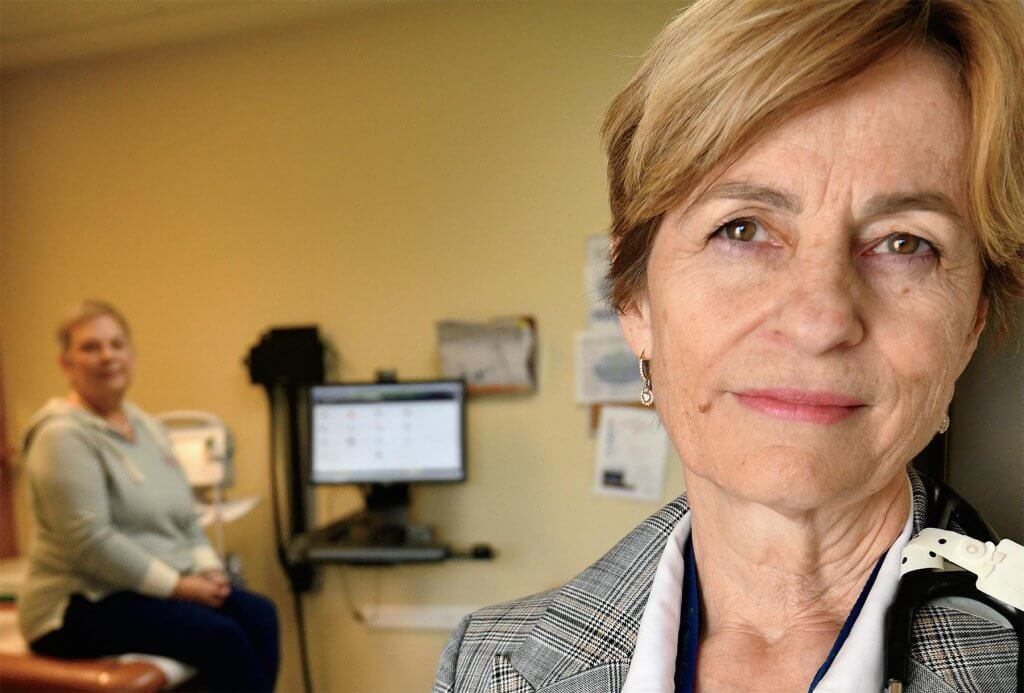Dr. Caroline Hamm already had a busy day ahead of her.
Her cancer clinic at Windsor Regional Hospital’s Met campus was booked back-to-back.
Then she got the call. Doctors at the Ouellette campus needed her to help identify what appeared to be acute leukemia in a patient in intensive care. If their fears were proven correct, the patient needed immediate treatment or he could die within 10 days.
Hamm raced out to the parking lot, drove to Ouellette, assessed the situation and did a biopsy. When she returned to Met nearly three hours later, there were nine patients in the waiting room.
“These are not earache patients,” says the medical oncologist. “They are cancer patients, here for a very important visit and they stress about these visits for weeks.
“They don’t know, I might be telling them that the chemo is not working…. But I have to leave them for hours to go to the other site to deal with this more critical patient,” she says.
The patient at Ouellette did have acute leukemia. Three years later he is cancer free and comes in for regular check-ups, says Hamm.
“Now he has to wait when I’m away at the other site,” she says.
It’s something that happens about three times a year, she says. And not just to her patients.
“All of us deal with this. Every cardiologist, every oncologist, every hematologist, every surgeon, every neurosurgeon,” says Hamm.
“It’s so unfair to everyone. Mostly to patients.”
Today’s medical students will graduate with the world at their feet – in high demand at hospitals across Ontario. And with so many other options, the prospect of co-ordinating care for patients across two different locations is a deterrent to medical students who have trained at Windsor Regional, says Dr. Larry Jacobs, associate dean for the Schulich School of Medicine & Dentistry’s Windsor campus.
“It scares people away from wanting to work in the community,” he says. “They already see the stress on the patient, families and physician and nurses involved in the care.”
Jacobs’s doctors in training have already experienced the struggle of trying to determine the best site for a patient with complex needs and trying to track down a specialist in the other building kilometres away.
“You’re trying to show them how great it is here, but you’re also showing them, ‘By the way you’re going to be with this kind of stress where you can’t take care of people at one site,’” he says.
Recruitment has been difficult in Windsor as a whole, says Dr. Wassim Saad, the hospital’s chief of staff.
“A lot of it has to do with the fact we are operating out of two sites,” he says. The hospital doesn’t keep statistics that confirm Saad’s claim, but he points to his experience interviewing potential candidates to fill important specialist positions.
Candidates are often “shocked” they would be required to cover two separate sites, says Saad. It is difficult to replace surgeons who retire or move, and when Windsor Regional is down a specialist that has a direct impact on patient care, he says.
Earlier this year, the hospital could only provide acute cardiology services at the Ouellette campus while it tried to recruit a cardiac surgeon to replace one who had left.
“It’s hard to recruit someone if you tell them ‘When you’re on call for an entire week you are going to have to be driving back and forth covering two sites of one hospital’,” he says.
“It’s a hard sell.”
He’s not surprised, knowing the hoops medical staff jump through on a regular basis to get patients services from the other site.
“It’s nothing but frustration and time-consuming phone calls,” he says, adding earlier in the week it took 48 hours for a patient with a brain bleed to get from the Met emergency room to the operating room at Ouellette.
To arrange for the elderly patient to be transported, re-assessed and admitted, then seen by a neurologist at the other campus, the doctor had to make six phone calls, says Saad. “If we were at a single site, it would’ve been one phone call to the neurology department. “It’s a daily thing.”
